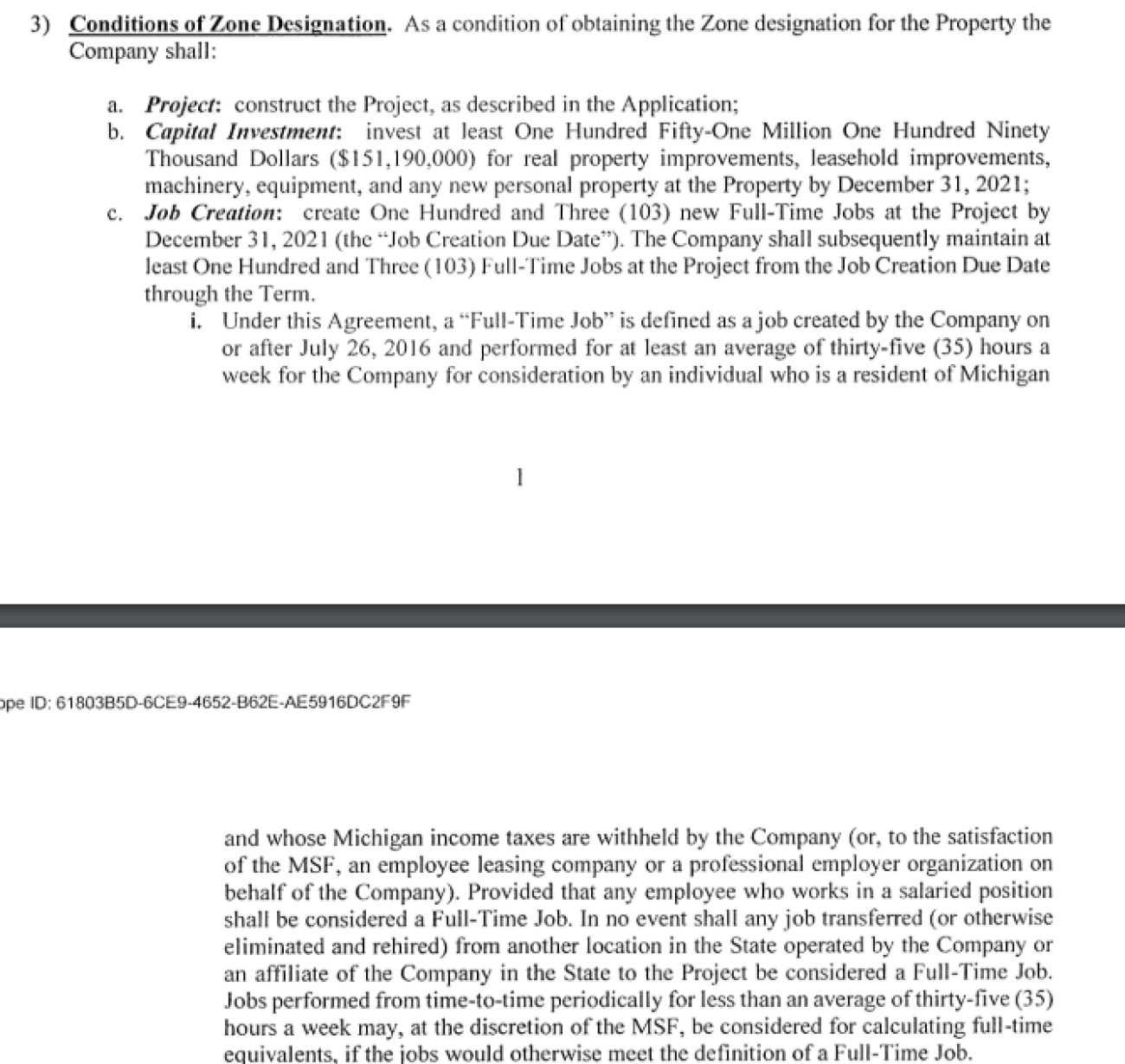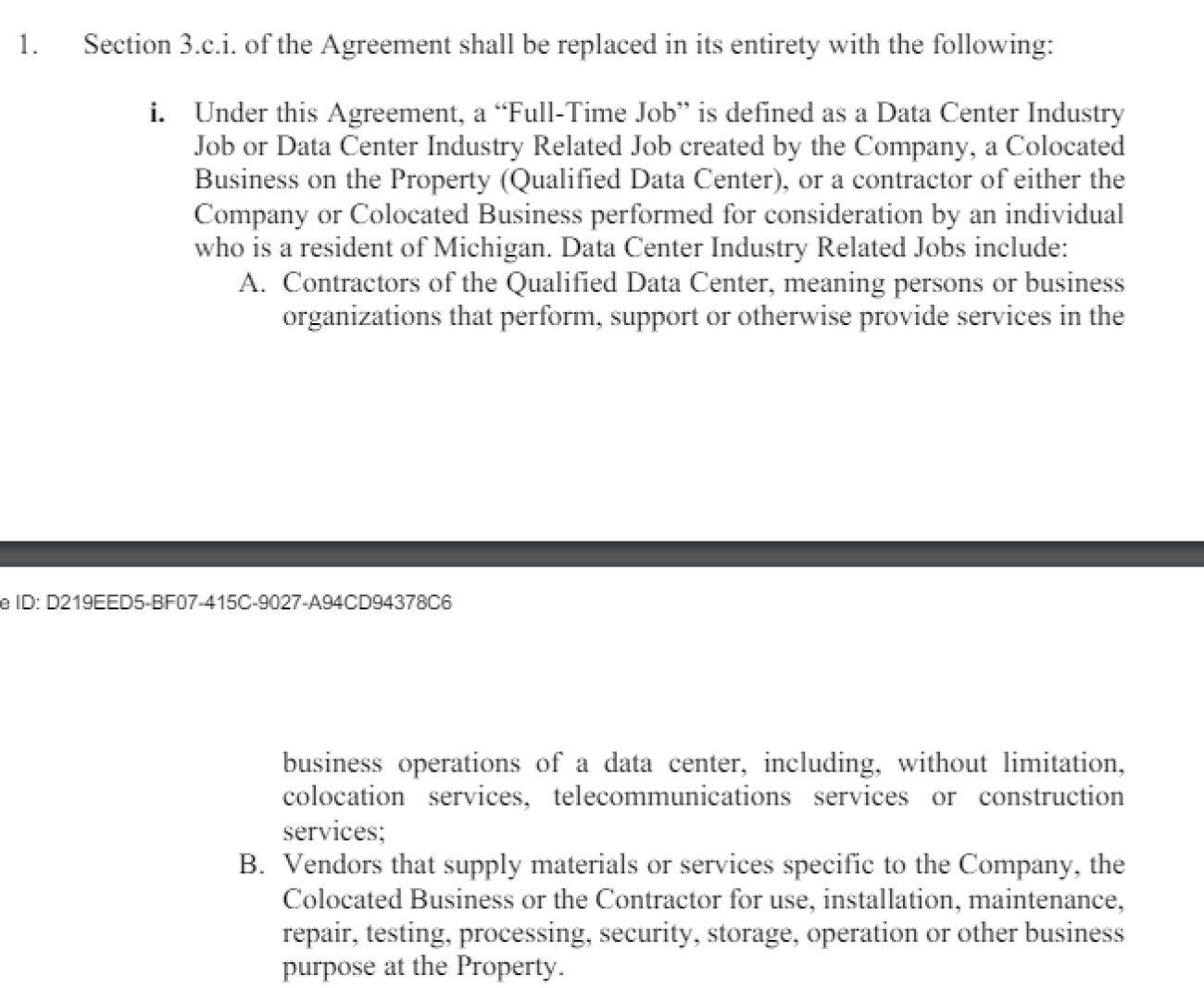Data centers create few jobs. Michigan wants to give them big tax breaks

- Michigan may expand tax breaks to lure data centers that serve as cloud storage space for tech companies
- States are in a race to land the businesses, but many create few jobs
- Backers say Michigan has learned from Switch, which promised 1,000 jobs for a tax break and produced 26 by 2022
LANSING — As Michigan weighs big tax breaks to lure multibillion dollar data centers, opponents are pointing to a pyramid-shaped building south of Grand Rapids as a symbol of what could go wrong.
In 2015, Nevada-based Switch promised to create 1,000 jobs and investment totaling $5 billion by building a data center in the 663,671-square-foot former Steelcase furniture company building in Gaines Township.
Instead, Switch had made only 26 jobs by a 2022 deadline. Some states discontinue tax breaks for companies that underperform.
Michigan’s solution: Retool the deal with Switch to redefine jobs, allowing the company to continue saving an estimated $1 million per year.
Switch is now amid an expansion, but its shifting promises are informing debate in Lansing about Michigan’s strategy of investing billions of dollars in incentives for new automotive and tech projects.
Related:
- Would tax break for MI data centers bring economic boon, or climate doom?
- Michigan has spent $1B on EV, battery plants. So far, they’ve created 200 jobs
- Critics fear Michigan is promising the moon to land cloud data storage firms
- Corporate subsidies cost Michigan $335M; 40% of deals create low-paying jobs
While lawmakers debate reforms, they’re considering bills to extend a key tax break that benefits Switch for an additional 15 years, while expanding eligibility in hopes of luring larger data centers built by tech companies like Google and Microsoft.
Proponents say business-friendlier tax policies would help Michigan compete against other states for the facilities, which are massive buildings filled with servers and other hardware used to store, process and transmit data.
“The frustration around Switch is warranted,” said Rep. Joey Andrews, D-St. Joseph and a sponsor of the proposed new tax breaks. “And all of us wanted to learn from that going into this.”

Most states competing for the centers also offer tax credits. But some fear the bills will set Michigan up for more deals with underwhelming payoffs.
Hugely-profitable tech companies need data centers to exist, Kasia Tarczynska of Good Jobs First, a Washington, D.C.-based nonprofit that opposes corporate subsidies. That means “there’s no need for state and local governments to encourage these projects,” she argued.
‘A difficult political choice’
The tax break debate comes at a period of rapid growth for the data center industry, which is expected to double in value by 2030 as companies seek power to fuel artificial intelligence, social media algorithms and cloud storage.
Modern facilities can be far bigger and more expensive than Switch, and scoring one often brings tradeoffs for host communities.
Construction and routine upgrades create lots of jobs for contractors, and the existence of a data center can prompt investments from related businesses. But the facilities themselves employ few full-time workers. Google, for instance, estimates that its two data centers in Virginia, have created about 150 full-time, temporary and vendor positions.
Data centers are a target of environmentalists because they use lots of water and electricity, but proponents say utilities are eager for new customers to help share the cost of pipes and power lines.
Taxes from data centers can be a boon to governments and schools. But the biggest tech companies have chosen to build only in states that offer significant tax breaks, similar to those offered to farmers and manufacturers.
“If a state doesn't decide to open up its sales tax exemption to data center servers, then thank you very much,” said Steve DelBianco, president and CEO of the Washington, D.C.-based tech industry group NetChoice.
“We’re not wanted, we won't come.”
Government officials face “a difficult political choice” when it comes to corporate incentives, said Jennifer Bird-Pollan, a tax policy expert and incoming Alan S. Schenk Distinguished Chair in Tax Law at Wayne State University Law School.
If neighboring states offer tax breaks, “it’s really hard to say that as a matter of principle, we’re not going to,” Bird-Pollan said. But the competition could become a “race to the bottom” in which communities offer ever-bigger subsidies in exchange for meager public benefits.
Some state lawmakers want Michigan to join the fray. A package under consideration in the House and Senate would expand an existing sales tax exemption that was initially created at Switch’s behest.
That law allows tax breaks through 2035 for so-called colocation data centers like Switch, which lease space to other companies.
The new bills would expand eligibility to large enterprise data centers, which are owned and operated by a single company, while pushing the sunset date to 2050 (2065 for facilities built on a brownfield).
Economic development officials in Andrews’ district hope to attract a data center to a 280-acre parcel outside Benton Harbor.
Andrews said such an investment would be “transformative” for the community, boosting property tax revenue and buoying water utilities that suffer from a lack of customers.
“You think about the number of places around the state that are looking for a new lease on life, that used to be manufacturing centers and now aren't,” he said. “This is an opportunity for them.”

A broken promise, a lowered bar
Other lawmakers say Switch should be a cautionary tale.
“We have overwhelming evidence that corporate handouts and subsidies don't work,” said Rep. Dylan Wegela, D-Garden City. “I don't know when that message will sink in, in Lansing.”
Nearly nine years ago, after approving tax breaks, lawmakers touted Switch as the cornerstone of a new west Michigan information technology economy.
"We're going to have a very highly populated community," then-Rep. Ken Yonker, R-Caledonia, said at the time, with new homes, restaurants, and other corporations all arriving on the company’s heels.
Switch promised that within a decade, the company would hire up to 500 workers averaging $60,000 to $200,000 per year, and spur creation of another 500 jobs outside the company.
Despite public announcements, Michigan lawmakers didn’t require Switch to produce that many jobs.
Instead, the tax break law required Michigan’s entire data center industry to create a cumulative 400 “data center industry jobs or data center industry related jobs” by January 2022.
Months later, Switch came back for more tax breaks while promising less.
This time, it vowed to hire 103 people by Dec. 31, 2021, in exchange for a 15-year property tax exemption approved by local governments and the Michigan Strategic Fund through a Renaissance Zone designation.
By the time the deadline rolled around, state records show, Switch had created 26 jobs. Those workers averaged less than $38,000 a year.
Rather than penalizing the company, officials in the Michigan Economic Development Corporation revised the deal to require less of the company.


Gone was the mandate for Switch to count only its own employees working at least 35 hours a week. Now, Switch could take credit for construction workers, vendors and other outside contractors, with no regard for how many hours they worked.
The company’s official job count suddenly skyrocketed thirtyfold to 864, while little changed on the ground.
Asked about the arrangement, spokesperson Otie McKinley said the MEDC does what it can to help companies succeed in Michigan.
“MEDC wants these companies to excel,” said McKinley. “And if there are times where there are challenges, then within reason, there are sometimes opportunities to help work with the company to ensure that they do meet the goals and continue to grow.”
A Switch spokesperson blamed the pandemic for the company’s failure to meet its original commitments, while claiming that Gov. Gretchen Whitmer’s administration — not Switch — had sought the changes to the company’s contract.
“Supply chains were completely seized up,” said John Truscott, CEO of Lansing-based public relations firm Truscott Rossman, which represents Switch.
Truscott said the state requested the change to the new jobs target to clean up inconsistent requirements between the Renaissance Zone agreement and the sales and use tax exemption lawmakers wrote into state law. McKinley agreed that was the effect of the change, but said Switch requested it.
The sales and use tax exemption saved Switch $2 million in 2022, the latest year for which state figures are available.
The state doesn’t track how much Switch saves through its Renaissance Zone agreement, but has previously estimated its value at $1.1 million a year.
Lessons learned?
Andrews, the St. Joseph Democrat who is a key sponsor of the latest tax break proposal, said lawmakers have crafted it to avoid repeating past mistakes with Switch.
First, they’ve dropped the illusion that data centers will be massive job creators. The bills would require enterprise data centers to invest at least $250 million and create 30 jobs paying 150% of local median wage to qualify for a sales and use tax exemption.
Second, state and local officials now recognize that the real benefit of data centers is in property taxes. Andrews said local governments today would be unlikely to offer tax breaks as generous as the ones Switch secured on top of its legislatively-approved sales and use tax break.
To add a measure of assurance, he said, bill authors are working on revisions that would authorize the Michigan Strategic Fund to intervene when it appears local officials are offering too much. He didn’t offer details about how it would work.
Critics of the bills are not reassured. After all, the Michigan Strategic Fund authorized Switch’s tax breaks and is included in recent criticisms over subsidies awarded to EV battery plants with limited transparency and deferred payoff.
“Corporate projects that eagerly accept tax breaks and handouts often fail to deliver on jobs they pledged,” said Rep. Andrew Beeler, R-Port Huron. “And the state shouldn’t be giving them a pass when they don’t keep their promises.”
Michigan on the map?
Back in Gaines Township, Switch is in the midst of an expansion to the Grand Rapids facility, which could cost up to $900 million. Truscott said the facility “helps put Michigan on the map” to the growing data center industry.
While the company was set back during the pandemic, Truscott said “the facts show they’ve far exceeded any promises since that time.”
As of today, he said, there are 148 full-time Switch employees working at the Gaines Township data center, plus 417 clients and 114 vendors with employees in the building, said Truscott, adding the company and its clients still plan to invest $5 billion by 2026.
Despite the delayed payoff, Gaines Township officials say they have no regrets about welcoming Switch.
In addition to reviving a formerly-vacant building that may have otherwise been demolished, the company pays the community of about 29,500 residents about $430,000 annually in taxes and related payments, said Laurie Lemke, who is township treasurer.
But the company never produced many of the local spinoff jobs once promised, said Rod Weersing, the township manager. And extending some of Switch’s tax breaks doesn’t seem necessary for a company that is “thriving,” Lemke said.
“They're doing well here. They're building. They're gaining new customers. So I think it's time for them to pay the regular tax rate,” she said.
Michigan Environment Watch
Michigan Environment Watch examines how public policy, industry, and other factors interact with the state’s trove of natural resources.
- See full coverage
- Subscribe
- Share tips and questions with Bridge environment reporter Kelly House
Michigan Environment Watch is made possible by generous financial support from:
Our generous Environment Watch underwriters encourage Bridge Michigan readers to also support civic journalism by becoming Bridge members. Please consider joining today.
See what new members are saying about why they donated to Bridge Michigan:
- “In order for this information to be accurate and unbiased it must be underwritten by its readers, not by special interests.” - Larry S.
- “Not many other media sources report on the topics Bridge does.” - Susan B.
- “Your journalism is outstanding and rare these days.” - Mark S.
If you want to ensure the future of nonpartisan, nonprofit Michigan journalism, please become a member today. You, too, will be asked why you donated and maybe we'll feature your quote next time!






